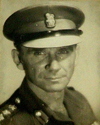

THE PRO PATRIA PROJECT
RENNIE Frank
30126 Colonel, New Zealand Army, WW2
KNOWN AWARDS
Commander of the Most Excellent Order of the British Empire (CBE)
Member of the Most Excellent Order of the British Empire (MBE)
Military Cross
1939-45 Star
Pacific Star
Italy Star
Defence Medal
War Service Medal 1939-45
New Zealand War Service Medal
General Service Medal
NOTES
Born 9 August 1918, Christchurch, New Zealand
Died 17 November 1992, Auckland, New Zealand
Buried Purewa Cemetery [Block Y Row 14 Plot 76]
BIOGRAPHICAL NOTES
He joined the Canterbury Regiment of the Territorial Force at age 16, before transferring to the Regular Force in late 1936. After completing basic training at Trentham Military Camp Rennie was first posted to the RNZA, but did not enjoy it and was 'first in the queue' to transfer to the Permanent Staff Instructors. At the completion of the training course Rennie was promoted to Lance Corporal, temporary Sergeant.
World War II
For the first two years WW2 he continued to be an instructor, as the instructing staff could not be spared for active service. During this time he helped select the initial officers and NCOs for the 28th Maori Battalion, and was for a period 'in interregnum' the RSM of Army Schools. Rennie observed that he, "must have been the youngest to have done so and, I am sure, with the most curious assortment of ranks, I was a substantive lance-corporal, temporary sergeant, acting warrant officer first class" After the Japanese attack on Pearl Harbor in December 1941, the 37th Battalion was rapidly raised to help reinforce Fiji and three instructors including Rennie were allowed to join with the rank of Sergeant. During his time in Fiji Rennie was commissioned and transferred to 30 Battalion as a platoon commander.
Jayforce to NZSAS
Rennie served with Jayforce, New Zealand's contribution to the occupation of Japan, between March and August 1946 before returning to instructional positions including a posting to the British Army School of Infantry and 2 ½ years as Chief Instructor of the New Zealand School of Infantry. He was involved in establishing instructional and training standards, and was awarded a MBE. In 1955 Rennie was selected to form, train and command the NZSAS Squadron for service in the Malayan Emergency. On this he wrote, "I must have been the only New Zealand officer ever to be given the right of total selection of all ranks in an organisation he was going to train and command operationally."
Malaya to Fiji
In late 1955 the Squadron deployed to Malaya and served successfully for two years, 18 months of which were spent operating in the jungle. Rennie often participated directly in operations, and for his actions during this time he was awarded the Military Cross and was Mentioned in Despatches. Upon returning to New Zealand the NZSAS Squadron was disbanded, and Rennie held a number of mainly staff roles before in 1961 taking up the position of Assistant Army Liaison Officer at the High Commission of New Zealand in London until 1965. He returned to New Zealand to become Commandant the Army Schools at Waiouru. After nearly 18 months at Waiouru, Rennie was promoted to Colonel and appointed as Commander of the Fiji Military Forces, a position he held until late 1969 as Fiji went through a period of racial tension between Indo-Fijians and Indigenous Fijians leading up to Fiji's independence from Britain in 1970. Rennie focused on fostering co-operation between the Fijian military and police, and on preparing the military to support the police in case of serious civil unrest, which threatened but did not eventuate during his tenure. Shortly after returning from Fiji, having been awarded a CBE, Rennie retired from the Army in 1970 after 34 years of service.
